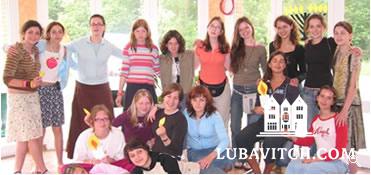Statistics compiled by the National Conference on Soviet Jewry project that of the 60 singing, cheering Jewish girls, who piled onto the bus to attend Camp Gan Israel of Vilnius, only six will marry Jewish men. Acutely aware of the assimilation pandemic, Chabad of Vilnius’s representatives, Rabbi Sholom Ber and Dina Krinsky used every moment of their two-and-a-half week camp to tempt the campers with the delights of Jewish living.
Attracting kids to camp was mission one. An exotic location: Troyes, France (a 40-hour bus ride away), the opportunity to tour Paris and meet Mickey Mouse at EuroDisney upped the proportion of newcomers to experienced campers. Parents were keener to sign on when they learned of the Krinskys’ choice of English speaking counselors alongside Russian and French speakers, because “I learned how to speak English” is not only a zinger for inclusion on “What I did this summer” essays but also a marketable skill. This and the noteworthy reputation built over the camp’s thirteen years brought 60 girls and, in a separate session, 60 boys to CGI this summer.
Now that camp T-shirts have been stowed for another year, Dina Krinsky’s schedule is booked solid with parent meetings. Twenty percent of the campers not previously attending Bais Menachem, Chabad’s nursery through twelfth grade school in Vilnius, want to enroll. Krisnky confabs with parents to work out the kinks before school begins in the fall.
More than trips up the Eiffel Tower and Seine River cruises, thoughtful programs and devoted counselors are why campers seek to continue their exposure to Judaism beyond summer. “The counselors were wonderful. They really brought happiness to the kids,” said Rabbi Krinsky. “A lot of children made significant strides in their appreciation of Yiddishkeit this summer.”
Girls’ camp head counselor Sarale Hecht from Orange, CT, mapped out her Jewish history camp plan during her year of study in a Chabad seminary in Vienna. Each day of camp revolved around significant moments and eras that shaped Jews as a People. Lessons, games, activities, trips and songs amplified themes from Creation to Matriarchs and Patriarchs and the Holy Temple. “Everything was intertwined and connected with action,” said Hecht. On Abraham and Sarah’s day, campers wrote messages to each other using quills and dug into the mitzvah of candle lighting before Shabbat. Topics reached deep into Jewish values. Water fights broke out when Noah’s deluge was discussed, but it was also the day when the mitzvah of “loving a fellow Jew” was explored. Malka Gerechko, 13, already emailed Hecht: “I learned a lot in the camp!”
Hecht was mindful that for many of the girls: “Camp is the yiddishkeit they get throughout their lifetime.” One camper back this summer from Hamburg, Germany, recited as much of the Shema prayer before bedtime throughout the year and awaited summer to learn more Jewish prayers. “Everything she hears gives her strength the whole year,” said a counselor, Lithuanian-born Miriam Sima Levina, who kept in touch with phone calls and emails from her teaching post in California.
Special attention was paid to the oldest bunk, fourteen girls ages 16 to 22. Unlike been-there-done-that peers in the States, the oldest bunk of high school and university students and graduates were “on their chairs cheering with the rest of the camp,” said Levina. Between activities, on walks through the picturesque Troyes marketplace, on the long bus ride home counselors fielded questions about Judaism. One frequently posed question, according to Miriam Mamykina was: “Why should I marry a Jew?”
Mamykina, who spent six summers at Camp Gan Israel of Vilnius, didn’t mince words. “There’s no time to mess around,” she said. “I asked them ‘How do you expect your children to be proud they are Jewish if you don’t marry a Jew?’”
Conversations with counselors yield results. Mamykina went from CGI to Bais Menachem to Chabad schools in Chicago and London and will be attending Chabad’s teachers’ seminary in Tzfat. Another former camper, Ester Raichman, is now Chabad’s representative in Kyrgyzstan. Following the boys’ overnight session, hundreds of campers have returned home requesting brit milah, putting on tefillin.
On her first Shabbat back in Vilnius, Asya – a camper from the oldest bunk – approached Levina with a question: “Please tell me when and where next year’s camp will be.”

Be the first to write a comment.